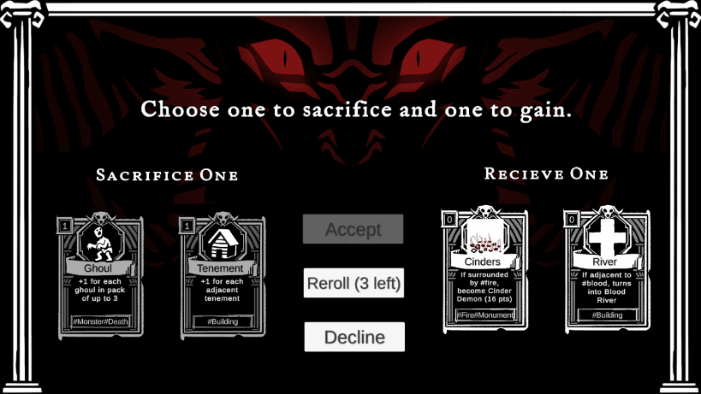Questions and Danswers

The other day I was sent an email by Ezra Szanton, the designer of the recently released game, Hellscaper (which he worked on with Fergus Ferguson, Unnathy Nellutla and Jake Sturim). He asked me a few questions about Luck be a Landlord and its design, and we agreed that I could publish my answers here so you can all read them as well!
Q: What's your philosophy around whether players should be able to "force" a strategy, or whether they should have to go with the flow. What are some ways you encourage that behavior?
A: I'm assuming by "force a strategy" you mean a player should be able to decide "I want to do X build" and it should always result in a win. I think this can work but a game needs to be designed around this philosophy. Luck be a Landlord is designed to reward the player for utilizing multiple strategies during the same run, so implementing a way to force strategies in it wouldn't make sense. One way I encourage this behavior is by making a "forced" strategy work less often (see Cultists).
Q: What is the main role you see items playing in luck be a landlord's design? (we didn't have time to implement "relic"s but in the future I'm wondering if they're more important than I thought)
A: I see items as a way to add more variety and strategy without adding another symbol to the slot machine. Slay the Spire relics would be much worse and less fun if they were cards in the player's deck instead of always being active.
Q: Did you ever struggle with symbol designs that ended up being too complex or confusing for players? How did you navigate the tension between complexity and readability?
A: I tend to follow Magic: The Gathering's "New World Order" philosophy of having less complexity on Common cards -- I feel I should note I'm entirely done supporting Wizards of the Coast for numerous reasons, them hiring Pinkertons being just one of them, but I still feel there's a lot that can be learned from the design of a nearly 30-year-old game -- Since the first few spins of Luck be a Landlord will only offer Common symbols, following this philosophy reduces the amount of confusion new players face. As players become more experienced with the game by playing it, they'll also see more complex symbols at a (hopefully) good pace.
Q: Are there any ways in which luck be a landlord "rigs" the game in the player's favor, in a seemingly random process?
A: There are a few ways. There isn't any Slay the Spire build-steering, like how taking a Claw card makes more Claw cards appear in the card pool (EDIT: It turns out this isn't actually the case in Slay the Spire, thank you to Josh for emailing me and causing me to double-check my research). However, I tried to design Luck be a Landlord in a way where players never think "oh, that's not fair." Like how if you pay your rent and are left with 0 coins, instead of losing the game since you don't have the 1 coin needed to spin the slot machine, I just give the player a coin since they made rent anyway. I go into this a bit more in this blog post.
Q: What are some of the key factors that you feel contributed to luck be a landlord's success with streamers?
A: I think there were two major factors. The first being that Luck be a Landlord is a roguelike deckbuilder. This kind of game is incredible for streamers and YouTubers since they can play it for long periods of time and still see new content in the game. I found that most streamers who played the game and enjoyed it played it on more than one stream, which is a huge compliment. I also found streamers returned to the game after significant updates were added in Early Access, which I of course emailed them about when they released. On that same note, the second factor that contributed significantly was cold-emailing content creators with Steam Keys. I made sure to email content creators who cover roguelikes and roguelike deckbuilders, who I found covered the game far more often than those who primarily covered other genres or a wide variety of genres.
Q: What's the most important thing about deckbuilder design that you learned while making luck be a landlord?
A: I genuinely don't know how to answer this question. I've learned so many things and gotten better at design in so many ways that it's impossible to pick one that's the most important. I will say that for marketing purposes, making it clear that your game is a roguelike deckbuilder is very important if you want your game to sell. This talk goes into great detail on that.
Q: What's a question I should have asked you? (and what's the answer to that question?)
A: I'll never pass up the opportunity to talk about free will, so you should've asked me if we have free will. The answer is no, we don't, but that doesn't make our lives and actions meaningless as many would argue. Yes, I'm serious.
Thanks for the questions, Ezra! If anyone else has questions they'd like me to answer, they can always send me an email.
-Dan